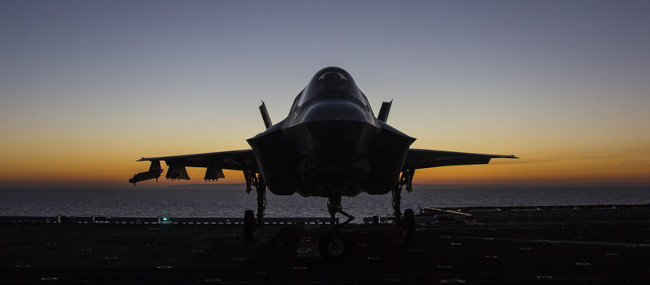
NATO report finds Canadian military spending has decreased despite alliance agreement
By Laura Osman, The Canadian Press
General DefenseIn response, PM Trudeau points to new investments in Norad and F-35 program.

(Photo credit: Lockheed Martin)
SCHLOSS ELMAU, GERMANY – Prime Minister Justin Trudeau is defending Canadian military spending as a new report released ahead of a major NATO meeting this week shows Canada heading in the wrong direction.
Members of the NATO military alliance agreed in 2014 to increase their defence spending to two per cent of their national gross domestic product, and the target is expected to be front and centre when leaders meet in Spain starting Wednesday.
But the new report released by NATO Secretary-General Jens Stoltenberg on Monday estimates Canadian defence spending will instead decline as a share of GDP to 1.27 per cent this year, down from 1.32 per cent last year and 1.42 per cent in 2020.
The report did not specify the reason for expected decline, or whether it includes $8 billion in promised new military spending that was included in April’s federal budget but whose purpose has not been clearly defined.
Asked about the report during a news conference at the end of this year’s G7 meeting in Germany, as he prepared to head to Madrid for the NATO leaders’ summit, Trudeau said the government has announced several “significant” new investments.
Those include $4.9 billion to upgrade Norad, the shared U.S.-Canadian system used to detect incoming airborne and maritime threats to North America, as well as plans to buy new fighter jets to replace Canada’s aging CF-18s.
The prime minister also said Canada has repeatedly proven its commitment to the NATO alliance by deploying troops and equipment on a variety of missions, including by leading a multinational NATO force in Latvia.
“Canada is always part of NATO missions and continues to step up significantly,” Trudeau said.
“We know how important it is to step up and we will continue to do so to make sure that the world knows that it can count on Canada to be part of advancing the cause of democracy, the rule of law and opportunities for everyone,” he added.
Yet Trudeau also sidestepped a question over whether Canada is prepared to send more troops to Latvia, as NATO seeks to double the size of its forces throughout the Baltics in response to Russia’s invasion of Ukraine.
Latvia’s ambassador to Canada told The Canadian Press earlier this week that Canada is talking with allies about reinforcing the Canadian-led battlegroup in his country.
The battlegroup in Latvia is one of four established by NATO in 2017, with Germany leading another such unit in Lithuania and Britain and the United States responsible for forces in Estonia and Poland, respectively.
Yet while Germany and Britain have both said in recent weeks that they are ready to lead larger combat units in Lithuania and Estonia, Canada has so far remained silent about its plans in Latvia.
Trudeau also wouldn’t say whether Canada is prepared to put more of the military on high readiness, as Stoltenberg announced on Monday that the alliance plans to increase the number of troops on standby from 40,000 to 300,000.
“We have been working closely with NATO partners, with the secretary-general of NATO, and especially with the Latvians, where Canada leads the (battlegroup) and is committed to making sure we continue to stand up against Russian,” Trudeau said.
“We, like others, are developing plans to be able to scale up rapidly,” he added. “And those are conversations that I very much look forward to having over the next couple of days in NATO.”
www.nato.int
